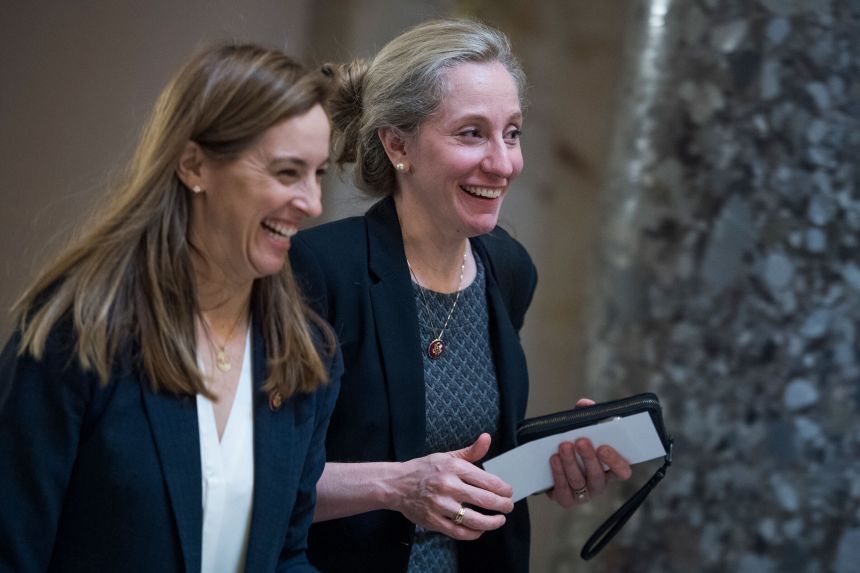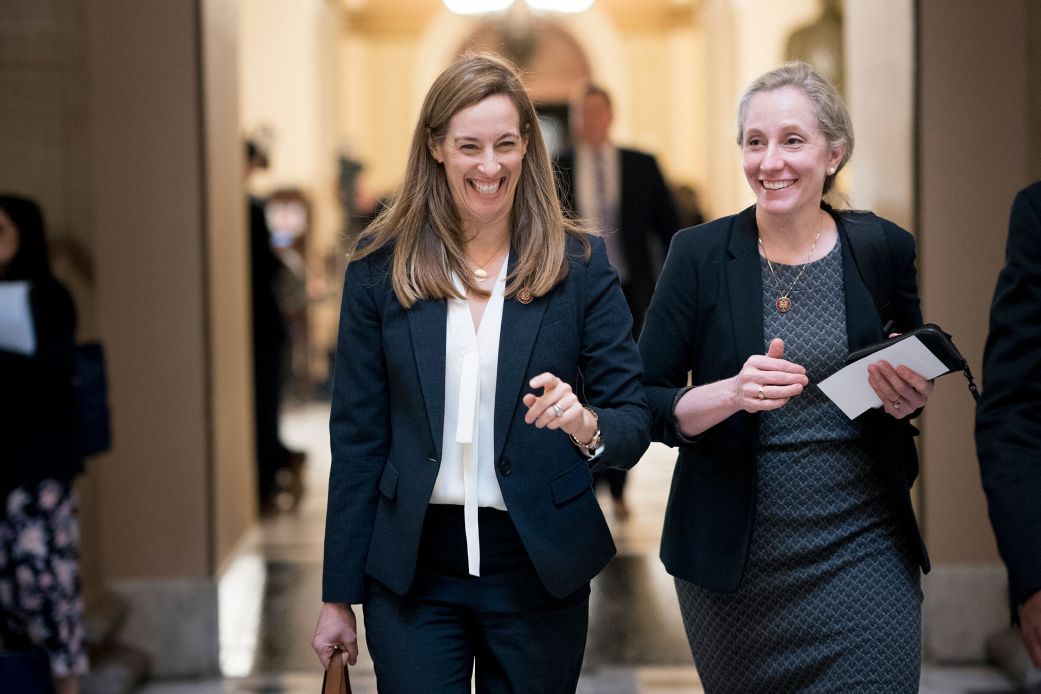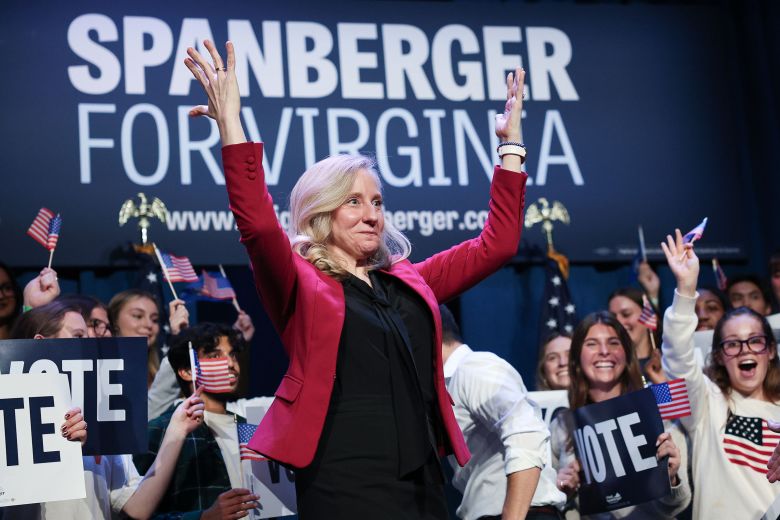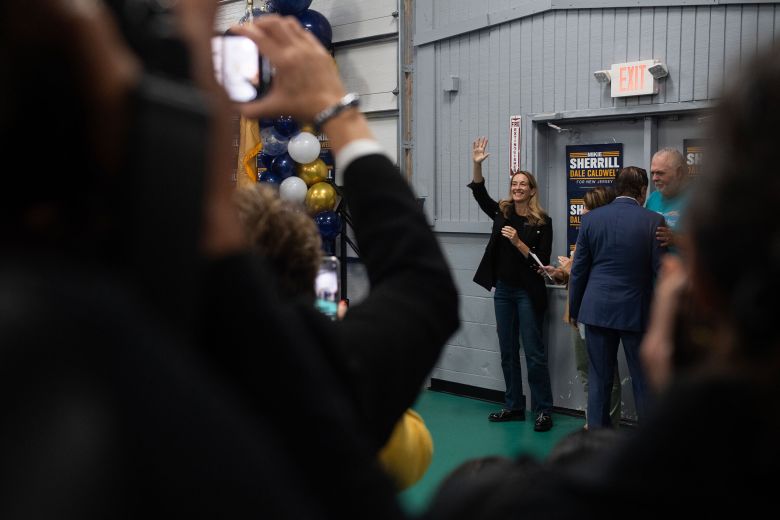They were faces of the Democratic resistance, a winning piece of the blue wave, when the party swept control of the House of Representatives in 2018 as a fierce reaction to President Donald Trump’s first two years in office.
Now, Abigail Spanberger and Mikie Sherrill are seeking to spur another Democratic revival. Their respective races for governor in Virginia and New Jersey offer potential lessons for the party as it tries to rise from political exile and find a pathway back to power.
“What we will do this November is not just vote against something, but we will vote for the policies that we believe in,” Spanberger told a crowded rally here this week. “Are you ready to win?”
A year after losing the White House and failing to win control of Congress, Democrats are working to move beyond the soul-searching and finger-pointing phase of their 2024 defeat. The November 4 elections are the latest test of the party’s efforts to rebuild, rebrand and rebound in the new Trump era.
“This one’s too important,” Sherrill told supporters on a recent night, hoping to impress upon them the urgency of the moment. “Make sure no one sits this out.”
New Jersey and Virginia are the only states in the country that elect governors the year after a presidential campaign. The races could hold lessons for Democrats as they seek to unify their fraying coalitions, try to win over any disillusioned Trump voters and recruit candidates for next year’s midterm elections.
Yet those races are only one chapter of the Democratic Party’s fight.
An epic generational and ideological clash is unfolding in New York City, where Zohran Mamdani is working to take command in a mayoral race with Andrew Cuomo. The spirited campaign has shined a light on the risks and rewards for a party still reconciling its identity and finding the best approach to address the affordability crisis and other challenges facing Americans.
Inside the blue wave
It was 2018 when Spanberger, a former federal agent and CIA officer, was elected to a Congressional seat in central Virginia long held by Republicans. Her national security credentials and more centrist views appealed to suburban voters turned off by Trump.
She once confronted progressive members of her own party in a private call, admonishing them “to not ever use the words ‘socialist’ or ‘socialism’ ever again.” She won hard-fought re-election battles before stepping down at the end of her third term to focus on her run for governor.
Her biography and a lifelong commitment to service is at the center of her bid for governor, where polls show she is leading Republican Lt. Gov. Winsome Earle-Sears. Top Democrats have flocked to Virginia, eager to highlight Spanberger as a broader example for where the party stands.
“Everything about her turns the GOP narrative about who Democrats are upside down,” Pete Buttigieg, a former Democratic presidential candidate and transportation secretary, said as he rallied Spanberger’s supporters here. “This is what the mainstream actually looks like.”
In New Jersey, Sherrill was also part of the class of Democratic candidates in 2018 whose national security credentials were at the heart of their quest to win seats once held by Republicans. Her advertising campaign is built around her training as a pilot, with images of her flying a helicopter saying: “The Navy taught me in a crisis you either find a way or make one.”
Locked in a particularly fierce fight in the closing days of the race, Republican challenger Jack Ciattarelli has called out Sherrill’s frequent references to her military service. He minced few words to one crowd last week, saying: “She’ll tell you she knows how to fly a helicopter, but she doesn’t know a damn thing about running the state of New Jersey.”
Capitol Hill roommates
Spanberger, 46, and Sherrill, 53, forged a friendship after arriving on Capitol Hill. They became roommates and still have a running conversation about their respective races and how both could become the first Democratic female governor of their state. (The winner between Spanberger and Earle-Sears will make history as Virginia’s first female governor.)
They’ve often talked about their common bonds, including how Spanberger was born in New Jersey and moved to Virginia at age 13, while Sherrill was born in Virginia and moved to New Jersey as an adult.

“Here’s somebody who comes from that national service background like I do. Someone who’s a mom, like I am. She has three kids, I have four,” Sherrill said in an interview. “I don’t think either of us thought we were going to run for office until in 2018 we felt called to serve again and have been in it ever since.”
They’ve also adopted similar approaches in their campaign by intentionally avoiding trying to add their voice to every Democratic criticism about Trump, but instead focusing on the tangible effects of Trump’s policies and whether he has lived up to promises made a year ago.
“He told people he would drive down their costs. I think a lot of people feel very let down,” Sherrill said. “As he’s raising their costs, he’s making billions of dollars. That is really speaking to people who say this is not some guy who has my interest at heart.”
For all the similar strains of their candidacies, their challenges are quite distinct.
Sherrill is seeking to replace Democratic Gov. Phil Murphy, who has been in office for eight years. Not since 1961 have Democrats won three consecutive elections as governor.
Spanberger is running to replace Gov. Glenn Youngkin, a Republican, which offers a far simpler case to make an argument for change.
‘Too many people to please’
As the fall campaign heads into the home stretch, more than a dozen Democratic voters in Virginia and New Jersey told CNN they feel hopeful the party is starting to gain confidence and find its footing one year after a punishing loss that sent Trump back to the White House.
“It will rebuild itself. It just takes time,” said Barbara Lee, a retiree from Staunton, Virginia, who waited in line to see Spanberger at the Jefferson Theater in Charlottesville. “We need new leadership. Abigail can start us off.”
But in the next breath, Lee echoed the sentiment of other Democrats when she said the party must work to extinguish ideological infighting that she believes runs as hot as ever.
“We just have too many people to please. That’s why it’s so hard for us,” Lee said. “We are being attacked from all areas – not just Republicans – but from our own party. So let’s get that out of the way and we can go on to what’s next.”





